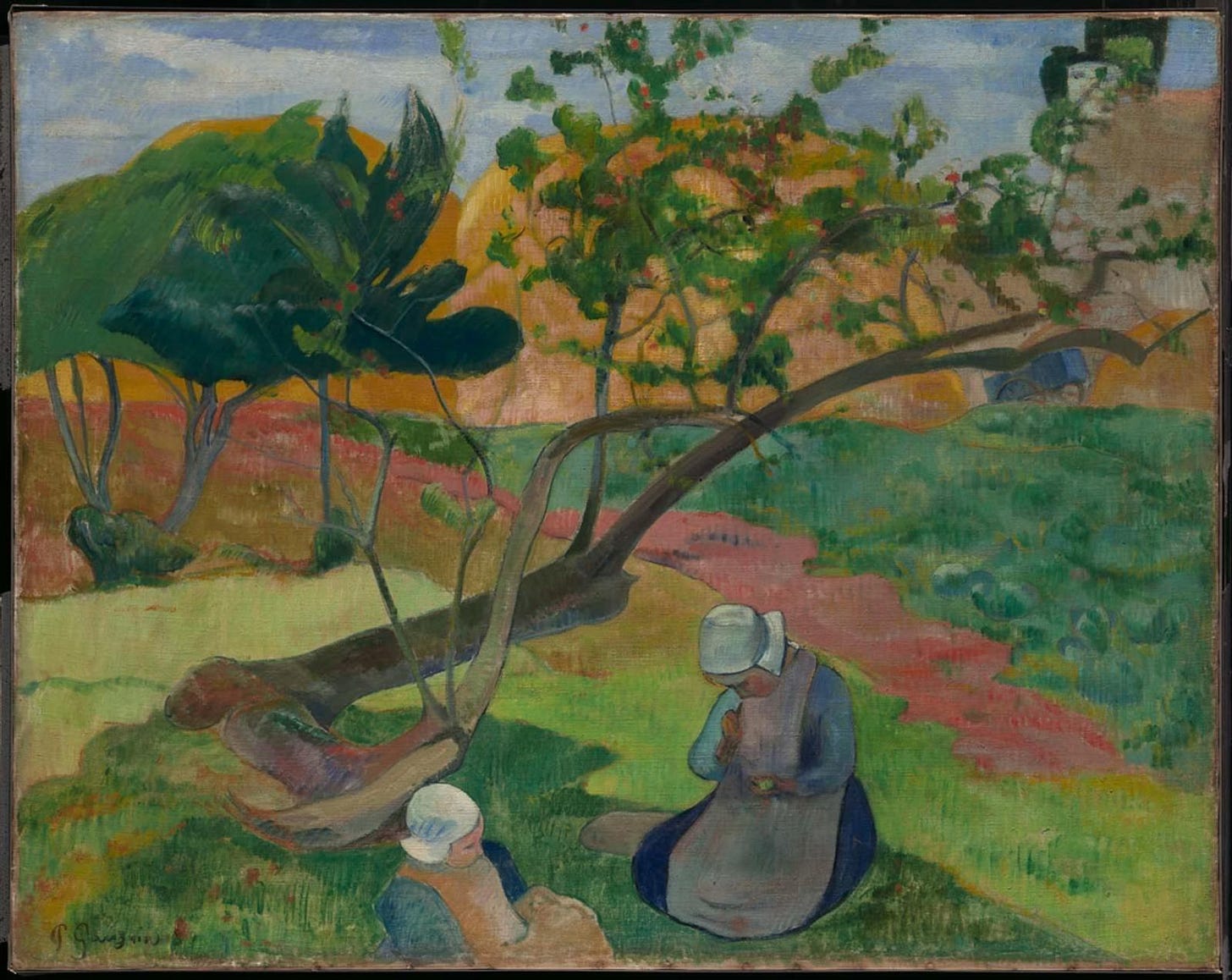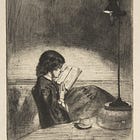We must find a way, you and I
Partial thoughts prompted by trees, traditions, a documentary, an Old English poem, Easter, empire, love, and Conclave
Hello! If you enjoy or find value in my work, please consider liking, sharing, or becoming a free or paid subscriber. It all helps. I really appreciate it.

On Good Friday, the children in my hometown can collect a paper bag containing two hot cross buns, an orange, and a Cadbury’s Creme Egg. The tradition usually takes place by the sea — there are trestle tables set up, and lots of volunteers, and thousands of bags given away for free. This year, my husband, young daughter and I planned to join in the tradition with members of my family who live there. My daughter will be the 5th generation of my maternal family line to take part in the tradition, which started in 1898. But it rained and rained, and the giveaway moved from the seafront to a church hall instead. The town band played while people were stewarded into and out of the hall. There wasn’t the same loitering and chance conversations as when the event happens outside, and it felt more efficient, more about getting something than sharing in something. Afterwards, determined to have a coffee with my sister and her family, we sat sheltering from the wind and the rain under a huge Oak tree in a nearby park, the children’s paper bags turning to mush. It’s a tree I recall sheltering and playing under when I was a child. In the intervening decades, the tree has become more itself and so have I. Both of us still have growing to do. Even as it grows though, the tree offers space for shelter and joy, for small pauses that can hold meaning. This is how I would like to be as I grow too.
On Good Friday evening, my husband and I ended up watching a recent documentary by historian Simon Schama called ‘The Road to Auschwitz’. It was not so much about the concentration camp itself, but about the complicity across Europe — the prejudice and bureaucracy — that led to the possibility and reality of the concentration camp. No country was — is — immune to the forces of fascism. Schama meets one of the few remaining survivors of the brutality, Marian Turski, who says that “Auschwitz did not fall from the sky, it comes step by step, evil comes step by step, and therefore you shouldn’t be indifferent. Let’s start by reducing hatred, and trying to understand other people.” Turski reads from a poem called Compassion: “The most important thing is compassion. Its absence dehumanises…” Turski died in February this year.
During that collaborative dehumanisation, a Dutch watchmaker called Corrie Ten Boom helped hide Jews from arrest and deportation during the German occupation of the Netherlands. Her defiance led to her arrest, imprisonment, and internment in two concentration camps. She survived though, and later became a Christian writer and public speaker. In our house, we have one of her books called The Hiding Place and from the bits I have read it is clear that despite everything she saw and experienced, she still insisted on love. Her father once told her, “Do you know what hurts so very much? It's love. Love is the strongest force in the world, and when it is blocked that means pain.” And later, he said “Corrie, if people can be taught to hate, they can be taught to love! We must find the way, you and I, no matter how long it takes.”
We must find a way, you and I, no matter how long it takes.
Corrie Ten Boom’s name is apparently an uncommon Dutch name. Ten Boom means ‘at the tree’. Her name seems to root in the defiance she lived out, her life offering shelter in the face of terror, her life planted in something deeper than fear, deeper than difference, deeper than the ease of complicity.
The Cathedral in our nearest city, Exeter, is home to the Exeter Book: the largest and perhaps oldest known manuscript of Old English literature. The book contains a dream-poem called The Dream of The Rood dating from at least the 8th century. ‘Rood’ is an old word for cross, and the poem is told from the perspective of the wooden cross, formerly a tree, on which Jesus died. The cross, the tree, is not silent wood but a vocal witness, participating in suffering and redemption: “I held the mighty King, / the Lord of Heaven; I dared not bow.” The tree seems to speak of something beyond cruelty, beyond the age itself. The cross is a tree, alive, witnessing.
I have been thinking of Ten Boom’s life, and of the Rood. Both seemed to live at a threshold, at a crossroad between empire and love. Both say there is another way, even when the world around them cried apocalypse.
My husband and I watched Conclave the other night. In the film, the conclave in question is the secluded meeting of Roman Catholic cardinals as they choose their pope. There is a line that has lingered with me, about “existing between the certainties of the world”. The characters live between power and faith, between tradition and change, between guilt and grace — like so many of us who live not in clarity but in the space between. Something that struck me was just how sealed in the cardinals are. They are trying to discuss and elect their leader when they are cut off from the world. There seemed to be no life in their space, but when it did force its way in, it brought light. The conclave — or perhaps our life — is a place of discernment, of tension, of the in-between. At its best, and perhaps like the Rood, and like Corrie Ten Boom, it is a place not of answers but of presence. Not control but discernment. But these postures can be hard to adopt when you are sealed in the certainties of your mind, or of the world. It is hard to reach for presence and discernment and grace when you touch walls more than windows. But like Ten Boom said: “Love is larger than the walls which shut it in.” And so there is work to do in breaking down walls — not just the walls out there which keep people shut in hells, but also the walls in here, in our own hearts.
So what? —
Schama’s documentary both shook and steadied me. Horror begins somewhere — perhaps in the silences and small accommodations that we think bring dignity when in fact they can bring death: to others, to our hearts, to our rootedness. Even when the world is on fire though, or flooded with fear, there are trees and people that are rooted deeper than the world and which offer shelter. I think it requires courage to be a tree, but also to take shelter under one.
Easter, and the rood, and Ten Boom, and every act of resistance — with their layers of suffering and rising — ask something of us: to witness, to root deep, to be alive to the world’s ache as well as its hope, to find or become places of shelter in this time we find ourselves in.
In the Dream of the Rood, these lines:
Now — my life hopes forward,
to find permit to trace the track
of that triumphant tree,
lonesome more often than not —
lauding those limbs as befits
more than other mortals.
The urge in me urges urgently,
the patronage of my heart rood-right
Now, the urge in me urges urgently to root deep and get my heart right: courageous, honest, offering shelter, witnessing darkness, hoping forward into light.
As I finish writing this, the headlines tell me that the Pope has died. I am not a Catholic, and yet my life hoped forward when I read some of his writing. In his 2015 letter, for example, he wished to “enter into dialogue with all people about our common home.” He said that “The violence present in our hearts, wounded by sin, is also reflected in the symptoms of sickness evident in the soil, in the water, in the air and in all forms of life. This is why the earth herself, burdened and laid waste, is among the most abandoned and maltreated of our poor”
I do not believe we were born with sin and violence in our hearts, I think we were born creative and loving. But having read Elizabeth Oldfield’s book Fully Alive, and seeing sin as really about the causes of disconnection from ourselves and each other and the world, I see how this disconnection is pulling us and the world apart, making us forget who we are and who we can be. The late Pope said “Nothing in this world is indifferent to us.” But it is easy to become indifferent to the world. That is how, as Marian Turski said, “evil comes step by step”. Ten Boom said that the perpetrators of the holocaust displayed “such blatant evil one could almost believe one's own secret sin didn't matter.” But the small, secret disconnections we carry are what collectively can add up to the world’s horrors if we let them — war, slavery, genocide, concentration camps, abuse of the only planet we’ll ever have and the only neighbours we’ll ever have.
And so maybe this is what I am left with after Easter this year: an urge to pay attention. To bring those small disconnections and indifferences into the light and ask others to help me face them. To discern as well as have faith. To find good trees to shelter under and to become a deep-rooted shelter myself, pushing my roots and heart into deeper waters than the currents of the world. To keep growing into myself even as the storms keep coming.
In that wet park in my hometown on Easter Friday, briefly sheltering with my family, this line from The Dream of the Rood pushed into my consciousness. It’s a line spoken by the unnamed dreamer:
Then I prayed to the tree with a happy heart, eagerly, there where I was alone…
I was not alone. But I swiftly and silently prayed to the tree. I’m not entirely sure what about, but it was something like, In these storms and despairs, inbetween loveless and hopeless certainties, we must find a way, you and I. Help me to find it. When I look, I see little signposts everywhere. Do you? What do they say?
A few things I’ve been enjoying:
Ta-Nehisi Coates’ brilliant book The Message. He reminds me that “history is not inert", that our stories shape us and that we shape our stories. Imagination is a creative and vital force now at this crossroads of love and empire.
Anna Neima’s tender art and insightful newsletters. She paints and writes about a slower way of life, often in the home or the natural world. She’s on Instagram too.
This sundial carved by my Dad’s Dad, who I never met. I am drawn to its hopeful outlook. And yet a sundial can only tell us about the sun by letting shadow fall. It witnesses light by acknowledging dark.
Thank you for reading.
In case you missed them, some recent posts:









A beautiful meditation, following you through the day, and your reflections. Rich. Thank you!.
This is beautiful, Elizabeth. I love the elegant way you weave together such disparate references into something so fluent and complete